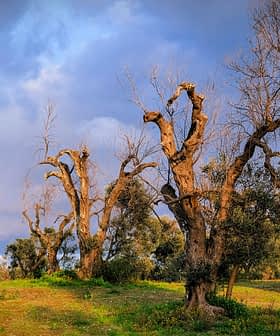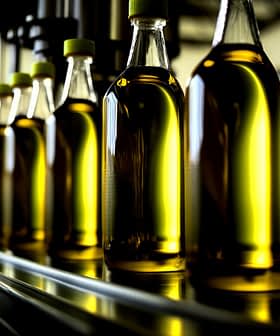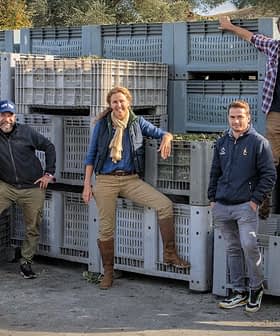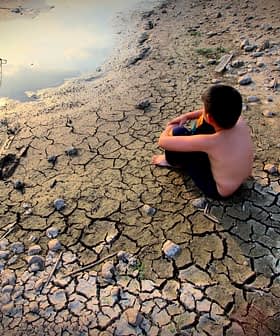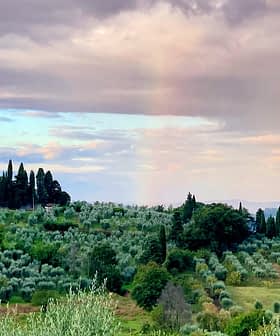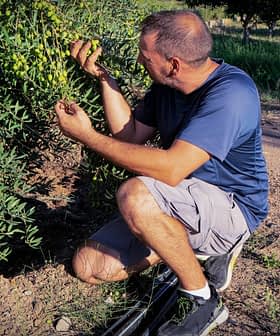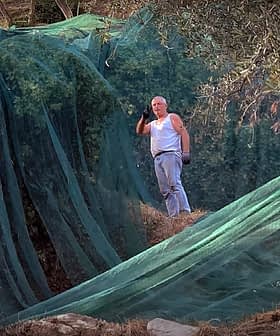Worker Shortages Problematic for Italian Farms as Harvest Nears
The usual influx of seasonal workers who come to harvest apples, grapes and olives in Italy has been interrupted. Travel restrictions related to Covid-19 has politicians and farmers worried that key crops will not be picked in time.
The shortage of foreign agricultural workers in Italy ahead of the 2020 harvest has farmers concerned, with 90% of the usual workers unavailable due to Covid-19 restrictions on international travel. The Italian government is working to address the issue by cracking down on illegal employment and providing work permits to incoming workers, while some producers argue that higher wages and better living conditions are needed to attract workers to the fields.
The shortage of foreign agricultural workers has many farmers, wine and olive oil producers worried ahead of the 2020 harvest in Italy.
In certain areas, including the olive-producing district of Belice, Sicily, farmers are struggling to recruit the 4,000 foreign workers usually required to harvest almost 18,000 hectares (44,500 thousand acres) of olive groves.
The harvesting season approaches and regional farmers will need foreign workers. Some countries where they come from, though, are considered high-risk due to the pandemic.
Ninety percent of those workers are currently unavailable as the harvest rapidly approaches. Some experts fear that many apples, grapes and olives may not be collected as a result.
Most observers attribute the labor shortage to the Covid-19 containment measures, which continue to hinder international travel. Workers coming from red-listed countries cannot freely move to Italy for the harvest. Others must first undergo complex procedures that have so far kept the numbers of incoming workers to a historic low.
See Also:2020 Harvest UpdatesOn top of the labor shortage, the Italian government is also trying to crack down on illegal employment in the agricultural sector.
While the process has slowed down the entrance of foreign farm workers to the country, the government argues that it is especially necessary, given the currency health crisis, to ensure a safe workplace for seasonal farm workers.
In recent weeks, more than 200,000 workers have filed for work authorization from the Italian Ministry of Agriculture.
“All of them now have a regular work permit, including 13,000 foreign citizens, who can now count on a legal green card,” Italian agriculture minister, Teresa Bellanova, said.
She added that the ministry is also about to release a digital network that helps workers find available jobs and assists in arranging transport.
While new funds have been directed to oil mills and olive oil producers hit by Xylella fastidiosa in the region of Puglia, the shortage and wellbeing of seasonal workers is also a relevant issue for many local authorities.
In the olive-producing district of Terlizzi, not far from Bari, the municipal council is officially considering a new approach to accommodate migrant workers. City councilman Vito D’Amato emphasized how “most workers during the harvest season end up living in spontaneous settlements, ghettos or tents in complete isolation.”
“[The pandemic] has highlighted their crucial role in agriculture,” he added. “It is of the utmost importance to recognize that role with safeguards and real action.”
The migrant workers and the safety measures are also the core of a heated debate in Belice.
Franco Lombardo, head of the local olive transformation company Geolive, told the CastelVetrano news magazine that tons of olives, including the famous Nocellara del Belice, are at risk of rotting on the trees.
The same worries were echoed by Felice Crescente, head of the local agricultural labor inspector agency, who explained that the labor shortage “involves the whole of Italy and lots of different products, from tomatoes to olives.” She added that the issue should be “strategically addressed since it involves not only migrant workers but also seasonal [Italian] workers.”
However, some producers believe that the focus on accommodating foreign farm workers is more so treating the symptoms than solving the underlying problems.
The head of a cooperative of agricultural workers in central Italy argued that if wages were higher, fewer migrant workers would be needed and those that did come would find better living conditions.
“I am not sure we are taking into consideration the harvesting costs in the new scenario,” Graziano Giovane told Olive Oil Times. “Low or very low pay is one of the main historical reasons that keep Italian and other workers away from the fields, as well as the living conditions many have to face during the season, especially if they come from abroad during this health emergency.”
“If we consider olive harvesting, for instance, I wonder how much farmers and producers are able to pay workers now that market prices are low,” he added. “[These same producers are also being] asked to be more efficient in order to ensure a safe workplace. We need a broader vision to win this battle.”
The farming association, Coldiretti, has also asked for the adoption of a new nationwide strategy for agricultural workers coming from abroad. The association has lobbied for quick coronavirus testing operations on arrival for all migrant workers in order to let them immediately reach their destinations.
In one of the most relevant wine producing districts in Italy, Veneto, local authorities, farmers and workers associations have just set up a new unit to quickly screen workers for Covid-19.
Francesco Benazzi, head of the local public health office in Treviso, told local media that “starting this week, we are ready to make the tests available to all agricultural cooperatives that employ workers coming from abroad.”
Given the numbers involved, the president of Piedmont, Alberto Cirio, has alerted local authorities in order to ensure a coordinated effort in monitoring the flow of seasonal workers coming from abroad, specifically from Covid-19-hit eastern European countries.
“The harvesting season approaches and regional farmers will need foreign workers,” Cirio said. “Some countries where they come from, though, are considered high-risk due to the pandemic. We all need to work together to monitor and quickly identify any risk.”
Coldiretti asked for action because workers are needed now in northern Italy for the apple harvest. Shortly afterwards it will be time to harvest wine grapes in the rest of the country.
Once all the apples and grapes have been picked, the olive harvest will be in full motion.
- Italian Ministry of Agriculture, Food and Forestry
- Italian Ministry of Agriculture, Food and Forestry
- Coldiretti


